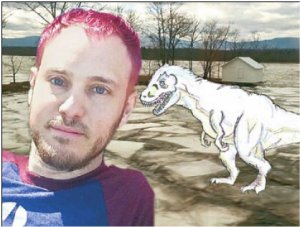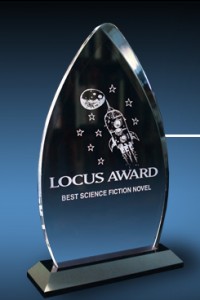Spotlight on: Sam J. Miller, Writer
Sam J. Miller is a writer and a community organizer. His fiction has appeared in Lightspeed, Asimov’s, Clarkesworld, Apex, Strange Horizons, and The Minnesota Review, among others. His first book, a young adult science fiction novel called The Art of Starving, will be published by HarperCollins in 2017. His stories have been nominated for the Nebula, World Fantasy, and Theodore Sturgeon Awards, and he’s a winner of the Shirley Jackson Award. He lives in New York City, and at www.samjmiller.com.
If you had to pick one of your stories to point our readers toward, which one would it be, and why?HOW CAN YOU MAKE ME CHOOSE BETWEEN MY CHILDREN? OK, IF I MUST… my recent story ‘‘Things With Beards’’, in Clarkesworld, because it’s new and maybe a li’l controversial. When Peter Watts wrote ‘‘The Things’’, he got shit because he made Childs a Thing. But not only did I make MacReady and Childs BOTH Things, they’re also gay men. So I imagine someone somewhere is having an apoplectic fit over it. OR I’M NOT DOING MY JOB. All kidding aside, the fact is, when you’re not used to seeing your stories told in mainstream movies and books, because those are populated solely by straight, white, cis people, you get really good at re-constructing those stories, re-telling them, in ways that make room for you. That’s what’s so exciting about fanfic, especially in the hands of diverse and marginalized creators. We are fans, and we will lay claim to these works. Stories belong to everyone; no one controls how we fill in the blanks. If someone watches John Carpenter’s The Thing and sees MacReady has pin-ups of sexy ladies on his wall and says That dude is straight, their interpretation is no more or less valid than if I see it and say, That dude really wants people to think he’s straight.
Tell us about your work as an activist and organizer. On a related note: How does that work influence your fiction?
I work for an organization that was founded and is led by homeless people, and my job is to magnify and amplify the voices of people experiencing homelessness to fight for social change around the negative laws and polices that impact them. That means a lot of protesting the NYPD, who since the 1990s has made pushing law-abiding homeless people out of public space its prime directive, and a lot of fighting City Hall, which is in the pockets of big real estate and has no interest in creating housing for very poor people. I’ve been doing it for 12 years now, so I imagine it’s influenced my fiction in a million ways, but the two main ones are these: (1) It’s given me a ton of insight into the profound injustice that’s an inextricable part of how the world functions; how real and monstrous the consequences of gentrification are, for example – 96% of families in NYC homeless shelters are Black and/or Latino, so remember that the next time someone tries to tell you systemic racism is a thing of the past. (2) It’s given me the opportunity to meet and work closely with hundreds of incredible people, many of them in the middle of unthinkably stressful and painful situations, who are nevertheless strong and smart and funny people who still face each day with incredible dignity and resolve. This gives me hope for how the rest of us will fare, when the inevitable climate-induced Collapse reduces us all to refugees in the rubble.
Your debut novel Art of Starving is forthcoming. Tell us about it.
It’s young-adult science fiction, about a bullied small-town gay boy with an eating disorder who believes that starving himself awakens a latent ability to read minds, control the behavior of others, and possibly bend the fabric of time and space itself. So, you know, light frothy stuff. Lots of F-bombs and gay sex. I was part of the Clarion class of 2012, and instructors Holly Black and Cassandra Clare told us there’s essentially nothing you can’t do in YA. Inadvertently, I think I ended up testing that proposition, and, yup, there’s essentially nothing you can’t do in YA.
Why do you write SF instead of, say, crime novels or mimetic fiction? What’s the appeal of the speculative for you?
I write speculative fiction because that’s how the world looks to me. Life is magic. Human society is horror. The world is science fiction. We carry tiny rectangles in our pockets that can access the sum total of human knowledge! Have you ever seen an ocean? THAT SHIT IS CRAZY AMAZING. And people do things to each other – with machetes, with policy decisions, with legislative pens – that are far more frightening than anything a shoggoth or werewolf could do. To me the world is so full of wonder and horror that speculative fiction is the only literature equal to the task of reflecting it. By telling the most ridiculous lies, we as speculative fiction writers can present the primal truths of human existence in ways that other genre and non-genre lit could never begin to do.
Is there anything else you’d like our readers to know about you or the work you do?
Just that while we still have a long way to go, we live in exciting times as genre readers and writers. A ton of brilliant new work is coming from writers of color, queer & trans & nonbinary folks, women, folks from outside the English-speaking Western world, and more… and the public temper tantrums of people who feel threatened by these new voices should be ignored like any other temper tantrum. But we also live in horrific times, in the world at large, whether it’s police murders of civilians of color, or mass shootings, or rape culture, or any number of other atrocities. More and more, I think it’s the storyteller’s job to insert the idea of ‘‘justice’’ into a world where it is so profoundly lacking, to show people that what we yearn for, what we fight for, can come to pass. Empires will fall; our oppressors will be punished; our suffering will be redeemed. The world we actually live in is profoundly unfair and unjust and cruel, but stories can help us escape – and imagine better ones. Our privilege and our oppression will be inverted. Our good acts and our wicked ones will be returned upon us. The ending might not be happy, but it will be just.







